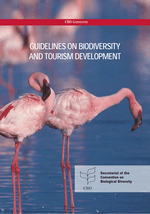The Convention on Biological Diversity (CBD)
The Convention on Biological Diversity (CBD) is an international treaty adopted in 1992 at the United Nations Conference on Environment and Development (UNCED) that came into force on 29th of December 1993. The convention aims at the development of strategies for the conservation and sustainable use of biodiversity that ensures long-term prosperity of future generations.
Biological diversity in its scientific sense means genetic diversity as well as the diversity of species and eco systems and their interrelations. Following the adoption of the Convention on Biological Diversity (CBD) in 1992 at the first World Summit on Environment and Development (UNCED), the term biological diversity took on a new meaning of increasing political importance in which mankind's responsibility for nature and natural resources plays an important role.
In this sense, the Convention of Biological Diversity establishes three main goals:
- conservation of biological diversity;
- sustainable use of its components;
- fair and equitable sharing of the benefits from the use of genetic resources (Access and Benefit Sharing, ABS).
Signing the convention, its member states (currently 194 states) commit themselves to consider and implement its goals.
Further information: www.biodiv.org
The CBD Guidelines on Biodiversity and Tourism Development
 Tourism is based on the attractions, beauties and services of nature and therefore plays an important role for the implementation of the convention. Tourism can contribute to the conservation of biological diversity if it uses natural resources in a way that guarantees the conservation and regeneration of nature and ecosystems. This can be achieved through adequate management practices and through financial support of the tourism business to the efforts of nature conservation.
Tourism is based on the attractions, beauties and services of nature and therefore plays an important role for the implementation of the convention. Tourism can contribute to the conservation of biological diversity if it uses natural resources in a way that guarantees the conservation and regeneration of nature and ecosystems. This can be achieved through adequate management practices and through financial support of the tourism business to the efforts of nature conservation.
At the 7th conference of the parties to the Convention on Biological Diversity in 2004, special Guidelines on Biodiversity and Tourism Development were adopted. These guidelines are voluntary and offer instruments for local, regional and national governments as well as for local stakeholders for the management of tourism activities in an ecological, economic and socially sustainable way.
During the development process of the guidelines, ETE supported the German Federal Ministry for the Environment, Nature Conservation and Nuclear Safety that was one of the agencies pushing the development of the guidelines. The guidelines constitute an important basis for the work of ETE and have been tested within the framework of several pilot projects.
Further information:
The CBD Guidelines on biodiversity and tourism: www.cbd.int/tourism
ETE projects: Projects tourism and biological diversity


